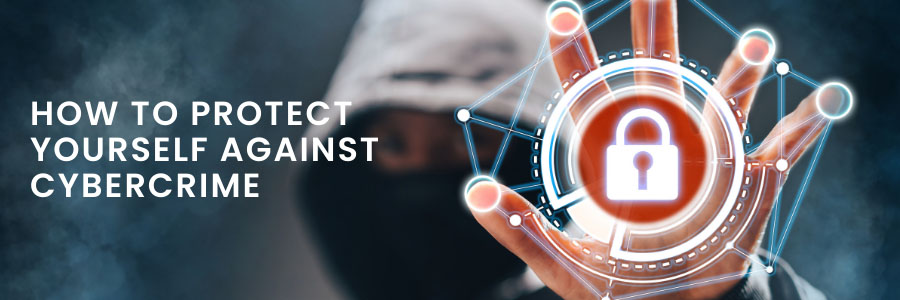How to Protect yourself against Cybercrime

Cybercrime has always been a problem.
You may believe that the only type of cybercrime you need to be concerned about is hackers taking your financial data. However, it may not be so straightforward.
There are considerably more issues to be concerned about than just money. Cybercrime is always changing, with new dangers emerging every year.
What is Cybercrime?
Cybercrime relates directly to any crime that takes place primarily or totally online. When committing crimes, cybercriminals usually target computer networks or devices.
Cybercrime includes security flaws and identity theft. Other cybercrimes include “vengeance porn,” cyber-stalking, harassment, bullying, and child sexual exploitation.
Terrorists collaborate over the internet, bringing terrorist acts and crimes into cyberspace.
How can you protect yourself from cybercrime?
Anyone who uses the internet should take some basic precautions. Here are 5 tips to help you protect yourself against the wide range of cybercrimes.
1. Secure your network with strong encryption and VPN
It’s a good idea to start with strong encryption and a virtual private network. A VPN will encrypt all traffic except that from your devices until it reaches its destination.
If cybercriminals attempt to hack your communication line, they will only intercept encrypted data.
When using a public Wi-Fi network, whether in a library, hotel, airport, or café, use a VPN.
2. Always keep your software up to date.
This is particularly crucial when it comes to your operating system and internet security software. To obtain access to your system, cybercriminals usually employ known exploits, or holes, in your software. By patching such exploits and holes, you can reduce your chances of becoming a cybercrime target.
To make this easier, allow automatic updates whenever possible. Install software to scan your system for viruses and malware, as well as anything else that might slip through the cracks.
3. Use a robust internet security tool.
Choose a security tool that provides real-time protection against existing and emerging malware, such as ransomware and viruses, and assistance in the protection of your personal and financial information when you go online.
Protect Your Valuable Information Against Data Infringement.
4. Don’t be fooled by pop-ups.
If you receive an email or a pop-up window asking you to enter your username or password, do not do so. Instead, launch your browser and navigate directly to the website.
If you’re still not convinced, contact the company or entity that allegedly got you. Know that established and well-known companies will never request your login information via email.
Be cautious of fake emails and text messages!
5. Use strong, unique credentials.
Username and password, especially difficult ones, are difficult to remember, which is why so much effort is put into discovering better alternatives.
However, for the time being, it’s crucial to use unique passwords that are distinct for each site, rather than easy-to-guess passwords like “123456” or “password.”Choose ones with a minimum of 14 characters.
Start with a favourite statement and just use the initial letter of each word after that. If you wish to add complexity, use numbers, punctuation, or symbols, but length is more crucial.
Make sure to change any factory-set default passwords, such as those included with your Wi-Fi router or home security gadgets.
In a conclusion, be careful, proactive, and knowledgeable.
